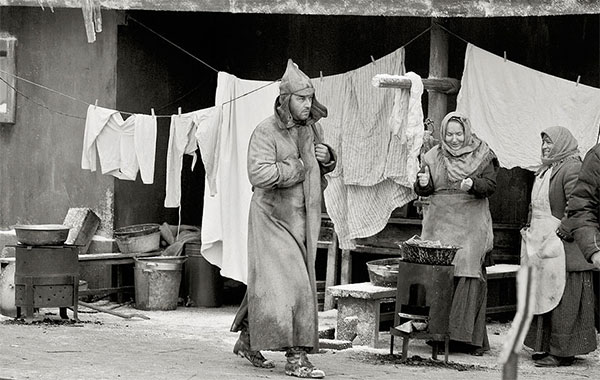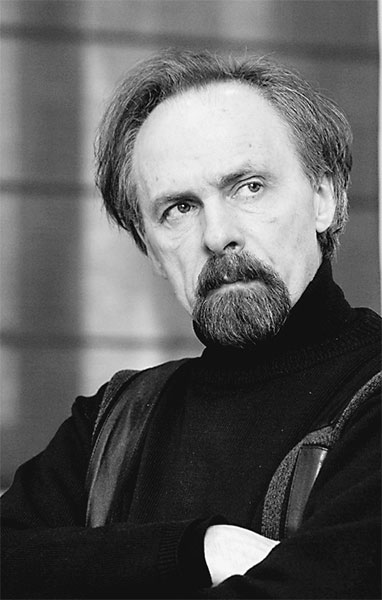
Konstantin Lopushansky: It's Exciting to Experience the Past Anew
/ Главная / Russkiy Mir Foundation / Publications / Konstantin Lopushansky: It's Exciting to Experience the Past AnewKonstantin Lopushansky: It's Exciting to Experience the Past Anew

The jury of the Russian Cinema Clubs Federation recongnized the Russian film Role by Konstantin Lopushansky at the 35th Moscow International Film Festival. The film’s action transports the audience back to the beginning of the 1920s. Actor Nikolay Yevlakhov decides that he would have to live another man's life, or rather to act it out like a role, capitalizing on a chance provided by the destiny.
At the end of the Civil war, trying to escape from Bolsheviks, Yevlakhov moves from one station to another with the White Army units. At one of the whistle stops Plotnikov, a Red Army commander, seizes the train with his detachment and decides to shoot down all White Army officers if there are any. Separating the military from civilians, the red officer decides who is worthy to live and who is not. Just for a moment he stops in front of Yevlakhov who does not know what to expect from his double: mercy or death. But Plotnikov has no time to make the fatal decision, plunging into a suddenly flared skirmish, and perishes.
Yevlakhov leaves with his wife for Finland where he serves at a theatre. However that tragic encounter and striking outward semblance with Plotnikov do not leave the actor at rest. He assesses everything that happened to him in winter 1919 as an opportunity to perform a feat in the name of art, playing his role in realistic "scenery". Buying out Plotnikov's dossier, Yevlakhov accustoms himself to the new role, crosses the border and lands in Petrograd where life is absolutely different from the one prior to the revolution.

— The main character serves the arts. Do you identify yourself with him?
You bet! One of the movie's themes is the mystery of creativity, its magic and the price paid by an artist for his or her masterpiece opening the door to human souls. It's not that important who the author is: a writer or an actor. In my story the mystery of art is related to national fortune and Russia's cultural heritage. For this reason the hero had the right to utter in the final: as I played this role the mystery of Russian history unfolded in front of my eyes, but I cannot boast this discovery as an author. This would be too self-confident and too straightforward.
— What drives the main character?
The attempt to think over the fratricidal war — a momentous turning point in our national history. To grasp the meaning of what happened to this nation, the actor is capable of doing only one thing: fitting into the image of a person on the opposite side of the barricades; fathom the homeland's ways by penetrating into other man's soul.
— Why did you approve Maxim Sukhanov for the main role without any casting?
He was an ideal match, one of the best national actors. Sukhanov is capable of making any image three-dimensional. This is a rare quality.
— Were the faces reminding of the epoch important to you?
It was important to enter the epoch, avoiding its tentative designation. Not like they do in TV series: taking two hats and "reflecting" them. It's not serious. When you entirely submerge into the past, a lot opens to your vision. Spectators are interested to experience the past anew, to feel its sound: how people lived then, their faces. For they looked different: sharp cheekbones, special demotic flair. The audience seldom think about it, but when they see something causing nebulous associations, they trust to what they see on the screen at the subconscious level.
— Why didn't you give your hero a chance for salvation?
He repudiated it himself. As a genuine artist, the actor realized: the final has to be tragic for him, Yevlakhov and the persona he acted. Plotnikov would hardly have survived the year 1938, so this is the only possible outcome. Any other end would be inaccurate and implausible."
— Does cinematography have its own mission?
It always does and this is a special mission in each particular epoch. In the days of Andrey Tarkovsky, when I was a student, this was a lofty idea of sending a spiritual message to man. The audience was reaching for the art bearing almost religious, Messianic ideas. People were standing in long lines to see The Mirror. Today the cinema's mission is entertaining the audience. This is a different time and there are different values and the artist in most cases is not a message bearer. This is life, but hopefully some time later we'll get back to the lofty matter."
Olga Nikonova
Kultura newspaper
| Tweet |
New publications

 Mikhail Kalatozov, a director who transformed the world of cinematography in many ways, was born 120 years ago. He was a Soviet film official and a propagandist. Above all, he was capable of producing movies that struck viewers with their power and poetic language.
Mikhail Kalatozov, a director who transformed the world of cinematography in many ways, was born 120 years ago. He was a Soviet film official and a propagandist. Above all, he was capable of producing movies that struck viewers with their power and poetic language.  Ukrainian authorities have launched a persecution campaign against the canonical Ukrainian Orthodox Church (UOC), the biggest one in the country's modern history. Over the past year, state sanctions were imposed on clergy representatives, searches were conducted in churches, clergymen were arrested, criminal cases were initiated, the activity of the UOC was banned in various regions of the country, and monasteries and churches were seized.
Ukrainian authorities have launched a persecution campaign against the canonical Ukrainian Orthodox Church (UOC), the biggest one in the country's modern history. Over the past year, state sanctions were imposed on clergy representatives, searches were conducted in churches, clergymen were arrested, criminal cases were initiated, the activity of the UOC was banned in various regions of the country, and monasteries and churches were seized.  When Nektary Kotlyaroff, a fourth-generation Russian Australian and founder of the Russian Orthodox Choir in Sydney, first visited Russia, the first person he spoke to was a cab driver at the airport. Having heard that Nektariy's ancestors left Russia more than 100 years ago, the driver was astonished, "How come you haven't forgotten the Russian language?" Nektary Kotlyaroff repeated his answer in an interview with the Russkiy Mir. His affinity to the Orthodox Church (many of his ancestors and relatives were priests) and the traditions of a large Russian family brought from Russia helped him to preserve the Russian language.
When Nektary Kotlyaroff, a fourth-generation Russian Australian and founder of the Russian Orthodox Choir in Sydney, first visited Russia, the first person he spoke to was a cab driver at the airport. Having heard that Nektariy's ancestors left Russia more than 100 years ago, the driver was astonished, "How come you haven't forgotten the Russian language?" Nektary Kotlyaroff repeated his answer in an interview with the Russkiy Mir. His affinity to the Orthodox Church (many of his ancestors and relatives were priests) and the traditions of a large Russian family brought from Russia helped him to preserve the Russian language.

 The leaders of the Friends of the Great Russia cultural association (Amici Della Grande Russia) in Italy believe that the Western policy of abolishing Russian culture in Europe has finally failed. Furthermore, it was doomed to failure from the beginning.
The leaders of the Friends of the Great Russia cultural association (Amici Della Grande Russia) in Italy believe that the Western policy of abolishing Russian culture in Europe has finally failed. Furthermore, it was doomed to failure from the beginning.  Name of Vladimir Nemirovich-Danchenko is inscribed in the history of Russian theater along with Konstantin Stanislavski, the other founding father of the Moscow Art Theater. Nevertheless, Mr. Nemirovich-Danchenko was a renowned writer, playwright, and theater teacher even before their famous meeting in the Slavic Bazaar restaurant. Furthermore, it was Mr. Nemirovich-Danchenko who came up with the idea of establishing a new "people's" theater believing that the theater could become a "department of public education."
Name of Vladimir Nemirovich-Danchenko is inscribed in the history of Russian theater along with Konstantin Stanislavski, the other founding father of the Moscow Art Theater. Nevertheless, Mr. Nemirovich-Danchenko was a renowned writer, playwright, and theater teacher even before their famous meeting in the Slavic Bazaar restaurant. Furthermore, it was Mr. Nemirovich-Danchenko who came up with the idea of establishing a new "people's" theater believing that the theater could become a "department of public education."  "Russia is a thing of which the intellect cannot conceive..." by Fyodor Tyutchev are famous among Russians at least. December marks the 220th anniversary of the poet's birth. Yet, he never considered poetry to be his life's mission and was preoccupied with matters of a global scale. Mr.Tyutchev fought his war focusing on relations between Russia and the West, the origins of mutual misunderstanding, and the origins of Russophobia. When you read his works today, it feels as though he saw things coming in a crystal ball...
"Russia is a thing of which the intellect cannot conceive..." by Fyodor Tyutchev are famous among Russians at least. December marks the 220th anniversary of the poet's birth. Yet, he never considered poetry to be his life's mission and was preoccupied with matters of a global scale. Mr.Tyutchev fought his war focusing on relations between Russia and the West, the origins of mutual misunderstanding, and the origins of Russophobia. When you read his works today, it feels as though he saw things coming in a crystal ball...